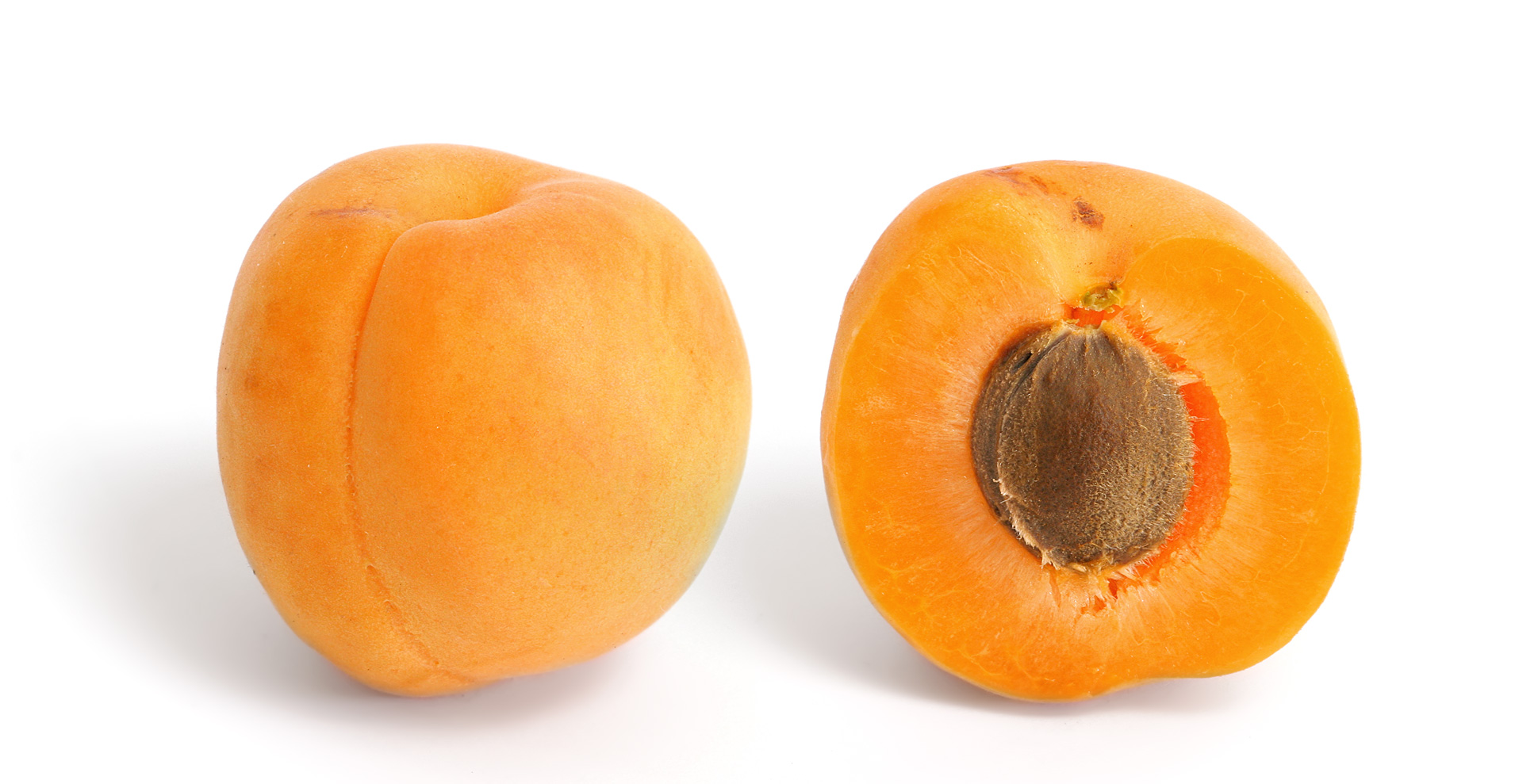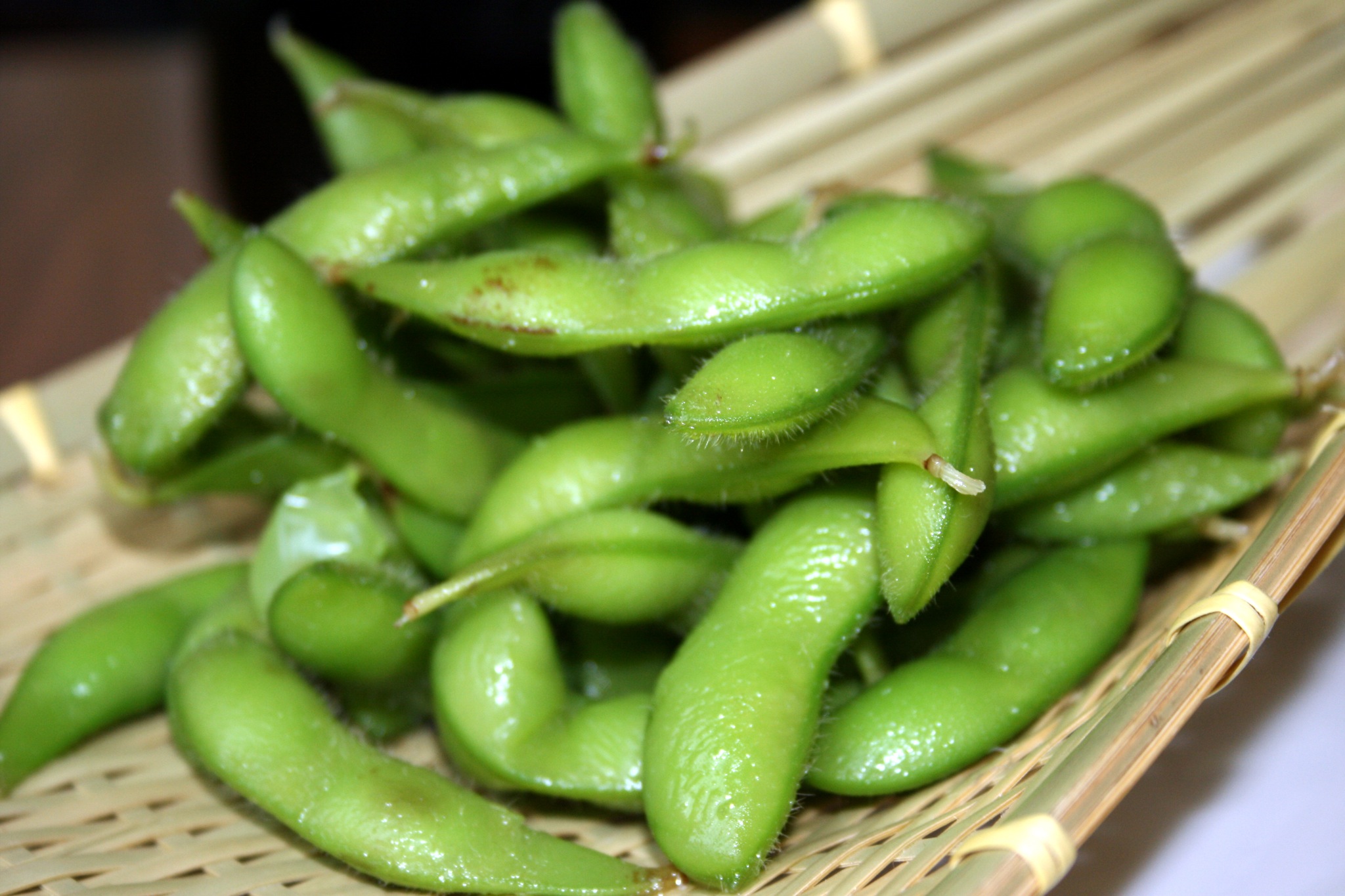Apricot vs. Edamame
Nutrition comparison of Apricot and Edamame
Ever wonder how your favorite foods stack up against each other in terms of nutrition?
We compared the nutritional contents of
apricot
versus
edamame
(100g each)
below using 2020 USDA and NIH data[1].
For a quick recap of significant nutrients and differences in apricot and edamame:
- Both edamame and apricot are high in potassium.
- Apricot has more beta-carotene than edamame, however, edamame contains more lutein + zeaxanthin than apricot.
- Apricot has signficantly more Vitamin A than edamame.
- Edamame has 3.2 times less sugar than apricot.
- Edamame has more thiamin, riboflavin and folate.
- Edamame is a great source of iron and protein.
- Edamame is an excellent source of calcium and dietary fiber.
USDA sources for nutritional information: Apricot (Apricots, raw) and Edamame (Edamame, frozen, prepared) . Have a correction or suggestions? Shoot us an email.
Calories and Carbs
calories
Edamame is high in calories and apricot has 60% less calories than edamame - edamame has 121 calories per 100 grams and apricot has 48 calories.
For macronutrient ratios, apricot is much lighter in protein, much heavier in carbs and much lighter in fat compared to edamame per calorie. Apricot has a macronutrient ratio of 11:83:7 and for edamame, 37:27:36 for protein, carbohydrates and fat from calories.
Macro Ratios from Calories:
| Apricot | Edamame | |
|---|---|---|
| Protein | 11% | 37% |
| Carbohydrates | 83% | 27% |
| Fat | 7% | 36% |
| Alcohol | ~ | ~ |
carbohydrates
Edamame and apricot contain similar amounts of carbs - edamame has 8.9g of total carbs per 100 grams and apricot has 11.1g of carbohydrates.
The carbs in edamame are made of 58% dietary fiber, 25% sugar and 17% starch, whereas the carbs in apricot comprise of 82% sugar and 18% dietary fiber.
dietary fiber
Edamame is an excellent source of dietary fiber and it has 160% more dietary fiber than apricot - edamame has 5.2g of dietary fiber per 100 grams and apricot has 2g of dietary fiber.
sugar
Edamame has 3.2 times less sugar than apricot - edamame has 2.2g of sugar per 100 grams and apricot has 9.2g of sugar.
Protein
protein
Edamame is a great source of protein and it has 751% more protein than apricot - edamame has 11.9g of protein per 100 grams and apricot has 1.4g of protein.
Fat
saturated fat
Both edamame and apricot are low in saturated fat - edamame has 0.62g of saturated fat per 100 grams and apricot has 0.03g of saturated fat.
trans fat
Both edamame and apricot are low in trans fat - edamame has 0.01g of trans fat per 100 grams and apricot does not contain significant amounts.
Vitamins
Vitamin C
Apricot has 64% more Vitamin C than edamame - edamame has 6.1mg of Vitamin C per 100 grams and apricot has 10mg of Vitamin C.
Vitamin A
Apricot has signficantly more Vitamin A than edamame - edamame has 15ug of Vitamin A per 100 grams and apricot has 96ug of Vitamin A.
Vitamin E
Edamame and apricot contain similar amounts of Vitamin E - edamame has 0.68mg of Vitamin E per 100 grams and apricot has 0.89mg of Vitamin E.
Vitamin K
Edamame has 709% more Vitamin K than apricot - edamame has 26.7ug of Vitamin K per 100 grams and apricot has 3.3ug of Vitamin K.
The B Vitamins
Edamame has more thiamin, riboflavin and folate. Both apricot and edamame contain significant amounts of niacin, pantothenic acid and Vitamin B6.
| Apricot | Edamame | |
|---|---|---|
| Thiamin | 0.03 MG | 0.2 MG |
| Riboflavin | 0.04 MG | 0.155 MG |
| Niacin | 0.6 MG | 0.915 MG |
| Pantothenic acid | 0.24 MG | 0.395 MG |
| Vitamin B6 | 0.054 MG | 0.1 MG |
| Folate | 9 UG | 311 UG |
Minerals
calcium
Edamame is an excellent source of calcium and it has 385% more calcium than apricot - edamame has 63mg of calcium per 100 grams and apricot has 13mg of calcium.
iron
Edamame is a great source of iron and it has 482% more iron than apricot - edamame has 2.3mg of iron per 100 grams and apricot has 0.39mg of iron.
potassium
Both edamame and apricot are high in potassium. Edamame has 68% more potassium than apricot - edamame has 436mg of potassium per 100 grams and apricot has 259mg of potassium.
Antioxidants and Phytonutrients
carotenoids
Carotenoids are micronutrients commonly found in plants and some animal products. An example is beta-carotene, the notable carotenoid which is a popular source of Vitamin A.[4][5]
For specific types of carotenoids, apricot has more beta-carotene than edamame per 100 grams, however, edamame contains more lutein + zeaxanthin than apricot per 100 grams.
| Apricot | Edamame | |
|---|---|---|
| beta-carotene | 1094 UG | 175 UG |
| alpha-carotene | 19 UG | ~ |
| lutein + zeaxanthin | 89 UG | 1619 UG |
Omega-3 and Omega-6
omega 6s
Comparing omega-6 fatty acids, edamame has more linoleic acid than apricot per 100 grams.
| Apricot | Edamame | |
|---|---|---|
| linoleic acid | 0.077 G | 1.792 G |
| other omega 6 | ~ | 0.002 G |
| Total | 0.077 G | 1.794 G |
Customize your serving size
The comparison below is by common portions, e.g. cups, packages. You can also see a more concrete comparison by weight at equal weight (by grams) comparison.
Apricot g
()
|
Daily Values (%) |
Edamame g
()
|
|||||
|---|---|---|---|---|---|---|---|
| KCAL % |
|
5% | calories | 5% |
|
KCAL % | |
| G % |
|
5% | carbohydrates | 5% |
|
G % | |
| G % |
|
5% | dietary fiber | 5% |
|
G % | |
| G | 5% | sugar | 5% | G | |||
| G % |
|
5% | total fat | 5% |
|
G % | |
| G % |
|
5% | saturated fat | 5% |
|
G % | |
| G | 5% | monounsaturated fat | 5% | G | |||
| G | 5% | polyunsaturated fat | 5% | G | |||
| G | 5% | trans fat | 5% | G | |||
| MG | 5% | cholesterol | 5% | MG | |||
| MG % |
|
5% | sodium | 5% |
|
MG % | |
| 5% | Vitamins and Minerals | 5% | |||||
| UG % |
|
5% | Vitamin A | 5% |
|
UG % | |
| MG % |
|
5% | Vitamin C | 5% |
|
MG % | |
| IU % |
|
5% | Vitamin D | 5% |
|
IU % | |
| MG % |
|
5% | calcium | 5% |
|
MG % | |
| MG % |
|
5% | iron | 5% |
|
MG % | |
| MG % |
|
5% | magnesium | 5% |
|
MG % | |
| MG % |
|
5% | potassium | 5% |
|
MG % | |
| MG % |
|
5% | thiamin (Vit B1) | 5% |
|
MG % | |
| MG % |
|
5% | riboflavin (Vit B2) | 5% |
|
MG % | |
| MG % |
|
5% | niacin (Vit B3) | 5% |
|
MG % | |
| MG % |
|
5% | Vitamin B6 | 5% |
|
MG % | |
| MG % |
|
5% | pantothenic acid (Vit B5) | 5% |
|
MG % | |
| UG % |
|
5% | folate (Vit B9) | 5% |
|
UG % | |
| UG % |
|
5% | Vitamin B12 | 5% |
|
UG % | |
| MG % |
|
5% | Vitamin E | 5% |
|
MG % | |
| UG % |
|
5% | Vitamin K | 5% |
|
UG % | |
| G % |
|
5% | protein | 5% |
|
G % | |
| UG % |
|
5% | biotin (Vit B7) | 5% |
|
UG % | |
| MG % |
|
5% | choline | 5% |
|
MG % | |
| MG % |
|
5% | chlorine | 5% |
|
MG % | |
| UG % |
|
5% | chromium | 5% |
|
UG % | |
| MG % |
|
5% | copper | 5% |
|
MG % | |
| UG % |
|
5% | fluoride | 5% |
|
UG % | |
| UG % |
|
5% | iodine | 5% |
|
UG % | |
| MG % |
|
5% | manganese | 5% |
|
MG % | |
| UG % |
|
5% | molybdenum | 5% |
|
UG % | |
| MG % |
|
5% | phosphorus | 5% |
|
MG % | |
| UG % |
|
5% | selenium | 5% |
|
UG % | |
| MG % |
|
5% | zinc | 5% |
|
MG % | |
| G | 5% | Water | 5% | G | |||
| G | 5% | Starch | 5% | G | |||
| G | 5% | Alcohol | 5% | G | |||
FAQ
Does edamame or apricot contain more calories in 100 grams?Edamame is high in calories and apricot has 60% less calories than edamame - edamame has 121 calories in 100g and apricot has 48 calories.
Is edamame or apricot better for protein?
Edamame is a great source of protein and it has 750% more protein than apricot - edamame has 11.9g of protein per 100 grams and apricot has 1.4g of protein.
Does edamame or apricot have more carbohydrates?
By weight, edamame and apricot contain similar amounts of carbs - edamame has 8.9g of carbs for 100g and apricot has 11.1g of carbohydrates. the carbs in edamame are made of 60% dietary fiber, 30% sugar and 20% starch, whereas the carbs in apricot comprise of 80% sugar and 20% dietary fiber.
Does edamame or apricot contain more calcium?
Edamame is a rich source of calcium and it has 390% more calcium than apricot - edamame has 63mg of calcium in 100 grams and apricot has 13mg of calcium.
Does edamame or apricot contain more potassium?
Both edamame and apricot are high in potassium. Edamame has 70% more potassium than apricot - edamame has 436mg of potassium in 100 grams and apricot has 259mg of potassium.

